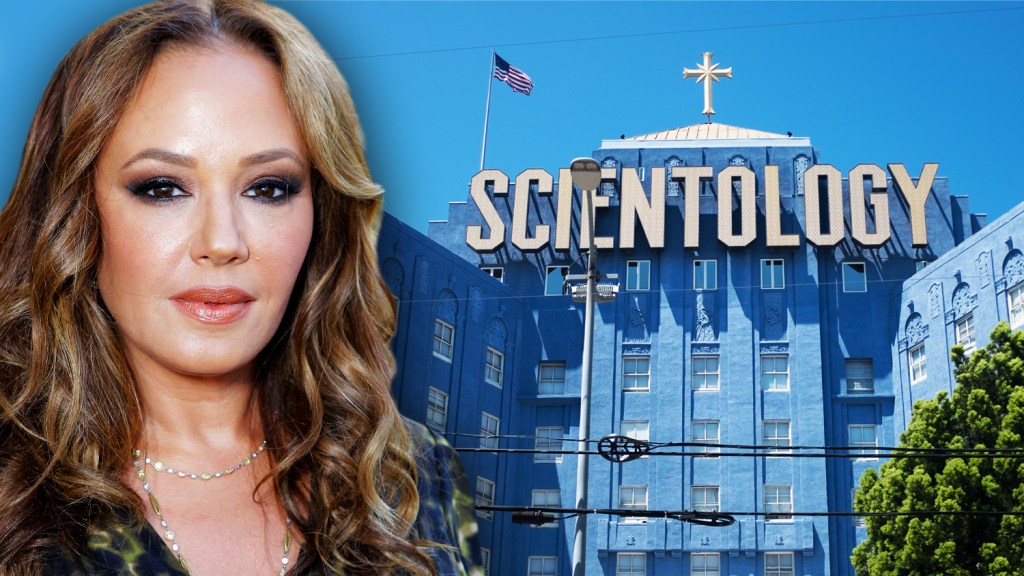
Leah Remini‘s defamation and harassment suit against the Church of Scientology is far from dead, but it’s constitutionally wounded.
In a March 12 split final ruling from Los Angeles Superior Court Judge Randolph Hammock (read it here), the David Miscavige-led organization has prevailed on getting significant portions of the ex-Scientologist’s action stricken on First Amendment grounds. However, parts of Remini’s harassment claims, “allegations of surveillance” and the tortious inference claim remain in the case going forward.
Having issued a tentative ruling on these matters weeks ago, and overseen hearings in DTA on January 16 and February 6, Judge Hammock’s final ruling doesn’t really contain anything anyone in the case didn’t know what coming. Still, even with an October 27, 2025, trial start date on the books right now, it would be foolish to say that Remini hasn’t suffered a setback from Scientology’s successful use of California’s muscular anti-SLAPP statute and free speech assertions.
“This is not a private dispute,” Hammock wrote in his long-awaited official decision in the long battle between the former King of Queens star and her former faith. “When viewed in context, the First Amended Complaint plainly demonstrates that the alleged statements Defendants made about Plaintiff online implicate a broader public dispute over Plaintiff’s relationship with Scientology. The online posts are themselves a part of the public’s interest in Plaintiff and Scientology.”
Rhetorically laying out his thinking, the judge added: “The Church is a high-profile entity speaking on a high-profile figure. Plaintiff is a high-profile figure speaking on a high-profile entity. Plaintiff’s speech is at times responsive to, or provoked by, Defendants, and vice versa.
“By engaging in the back-and-forth, purposely public battle against each other, the parties have made the issue one of significant public interest. Therefore, Plaintiffs allegations concerning Defendants’ online statements about her ‘arise from’ Defendants’ protected activities. Defendants have therefore met their burden for the speech implicated in these portions of the First Amended Complaint.”
Not long after Judge Hammock’s final ruling was filed on Wednesday, Scientology put out a triumphant statement. “This is a resounding victory for the Church and free speech — Remini’s complaint was gutted,” it said. “The Church is entitled to its attorney fees and will be seeking them.”
The judge concluded in his final ruling: “Given the mixed nature of this ruling, any patty may file a noticed motion for attorney’s fees and costs if they elect to do so. This Court makes no finding at this time whether there actually is such a right to attorney’s fees and costs by any party. The right to such attorney’s fees and costs, and the amount thereof (if applicable) will be determined at any hearing on a noticed motion. Be that as it may, any party who files such a motion should keep in mind the standards for such a request.”
A very vocal critic of Scientology since leaving the Church in 2013, Remini’s August 30 First Amended Complaint reiterated her earlier claims in the original August 2 filing of retaliation and more. Additionally, Remini, who has called out Scientiology repeatedly in relation to now-incarcerated member Danny Masterson’s trial and conviction on multiple rape charges last year, insists she’s been the subject of credit card fraud and attacks by online trolls since the original complaint was filed. In response, Scientology has accused Remini of being “a bigot” and made “threats of and actual violence against the Church.” Arguing for First Amendment and anti-SLAPP protection, the Church has also suggested Remini “should consider emigrating to Russia.”
While calling a number of the more vile online attacks against Remini by Scientology and its affiliates as something that “no one viewing those statements could take them literally” — Remini “loves rapists,” for example — and “more appropriately considered parody,” Hammock noted that “where the alleged defamatory conduct has not already been stricken on other grounds, Plaintiff has established the requisite merit of her claim for civil harassment.”
In what might still prove the legal silver bullet for Remini, the LASC judge also stated that the former Scientology and the Aftermath host “has established the requisite minimal merit of her claim for tortious interference as it pertains to the iHeartMedia contract.”
During Remini and ex-Church enforcer Mike Rinder’s 2021-22 podcast Scientology: Fair Game, the Emmy winner claimed that the Church stalked and harassed members of iHeartMedia’s production team — which led to the company terminating their contract with Remini and Rinder. In their defense, Scientology lawyers has said in past filings the Church is “entitled to exercise their free speech rights to demand a broadcaster remove offensive content.”
“Generally, the court agrees conduct of this type is not actionable,” Hammock wrote. “But what the Church cannot do is send agents to harass the podcast’s producers and staff, to the point that they feared for their safety. Therefore, Plaintiff has established the requisite minimal merit of her claim for tortious interference as it pertains to the iHeartMedia contract.”
Remini has commented publicly on Hammock’s final ruling, but she certainly hasn’t stayed silent either:
The next scheduled action in this case is a preliminary injunction hearing set for September 10 – just over a month before the trial on the remaining claims is set to start. The purpose of the injunction is to halt the alleged surveillance of Remini – a claim this final ruling clearly takes very seriously.